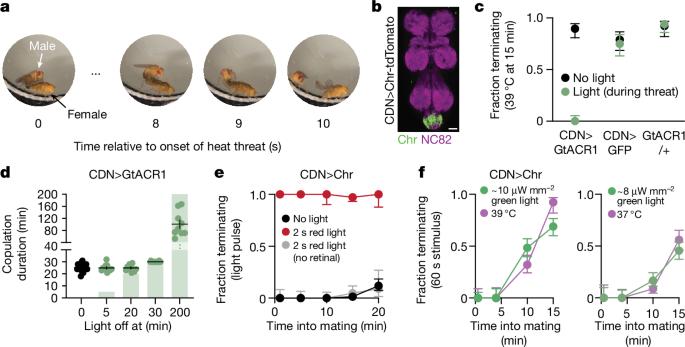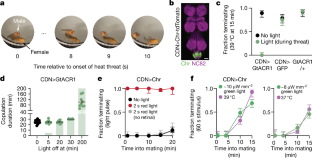Dopamine biases decisions by limiting temporal integration
IF 50.5
1区 综合性期刊
Q1 MULTIDISCIPLINARY SCIENCES
引用次数: 0
Abstract
Motivations bias our responses to stimuli, producing behavioural outcomes that match our needs and goals. Here we describe a mechanism behind this phenomenon: adjusting the time over which stimulus-derived information is permitted to accumulate towards a decision. As a Drosophila copulation progresses, the male becomes less likely to continue mating through challenges1–3. We show that a set of copulation decision neurons (CDNs) flexibly integrates information about competing drives to mediate this decision. Early in mating, dopamine signalling restricts CDN integration time by potentiating Ca2+/calmodulin-dependent protein kinase II (CaMKII) activation in response to stimulatory inputs, imposing a high threshold for changing behaviours. Later into mating, the timescale over which the CDNs integrate termination-promoting information expands, increasing the likelihood of switching behaviours. We suggest scalable windows of temporal integration at dedicated circuit nodes as a key but underappreciated variable in state-based decision-making. In Drosophila, dopamine sets motivational state during mating by regulating the integration of competing drives in copulation decision neurons, potentially indicative of a more general role for control over neuronal integration time in the regulation of behavioural decisions.


多巴胺通过限制时间整合使决策产生偏差。
动机会影响我们对刺激的反应,从而产生与我们的需求和目标相匹配的行为结果。在这里,我们描述了这一现象背后的机制:调整刺激衍生信息的累积时间,从而做出决定。随着果蝇交配的进行,雄性果蝇不太可能通过挑战继续交配1-3。我们的研究表明,一组交配决策神经元(CDNs)灵活地整合了有关竞争驱动力的信息,以介导这一决策。在交配早期,多巴胺信号通过增强Ca2+/钙调蛋白依赖性蛋白激酶II(CaMKII)对刺激性输入的激活来限制CDN的整合时间,从而为改变行为设置了一个高阈值。交配后期,CDN整合终止促进信息的时间尺度扩大,增加了行为转换的可能性。我们认为,专用回路节点的可扩展时间整合窗口是基于状态的决策过程中一个关键但未被充分重视的变量。
本文章由计算机程序翻译,如有差异,请以英文原文为准。
求助全文
约1分钟内获得全文
求助全文
来源期刊

Nature
综合性期刊-综合性期刊
CiteScore
90.00
自引率
1.20%
发文量
3652
审稿时长
3 months
期刊介绍:
Nature is a prestigious international journal that publishes peer-reviewed research in various scientific and technological fields. The selection of articles is based on criteria such as originality, importance, interdisciplinary relevance, timeliness, accessibility, elegance, and surprising conclusions. In addition to showcasing significant scientific advances, Nature delivers rapid, authoritative, insightful news, and interpretation of current and upcoming trends impacting science, scientists, and the broader public. The journal serves a dual purpose: firstly, to promptly share noteworthy scientific advances and foster discussions among scientists, and secondly, to ensure the swift dissemination of scientific results globally, emphasizing their significance for knowledge, culture, and daily life.
文献相关原料
| 公司名称 | 产品信息 | 采购帮参考价格 |
|---|
 求助内容:
求助内容: 应助结果提醒方式:
应助结果提醒方式:


